Troubleshooting Car Stereo Engine Noise Through Speakers
Picture this: you’re cruising down the road, ready to enjoy your favorite tunes, but instead of crisp, clear music, you’re met with annoying whining noise through speakers in your car. Don’t worry; you’re not alone. Engine noise is a common problem faced by many car owners, but fortunately, there are solutions to tackle this issue.
In this blog post, we will explore the causes of engine noise through speakers, as well as the best methods to diagnose and fix the problem. So, buckle up and get ready to make your car audio experience as smooth as your ride.
Understanding the Causes of Engine Noise in Car Speakers
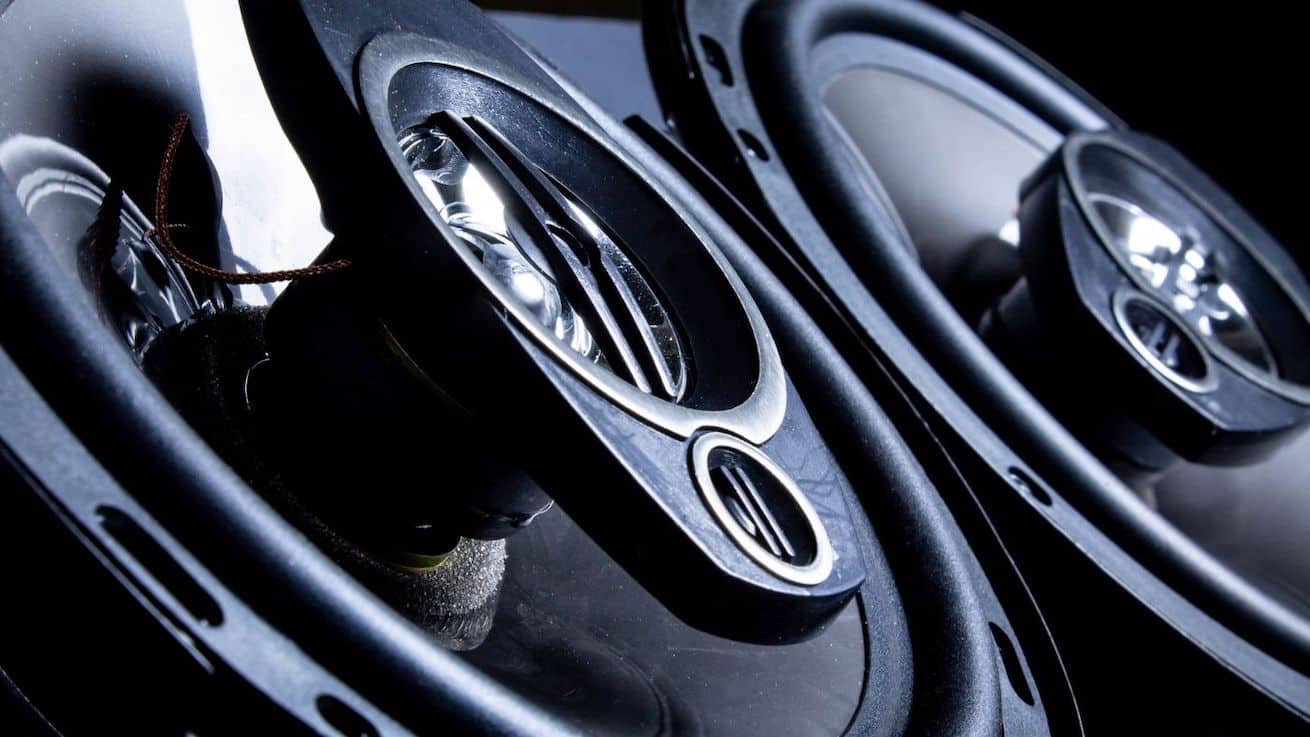
Engine noise in speakers can be quite frustrating, especially when you’re trying to enjoy your music. Generally, an engine noise problem in your audio systems can be attributed to three main factors: grounding issues, power source interference, and alternator charging noise. Identifying the source of the noise is the first step toward effectively addressing the problem.
A whining noise or clicking sound that fluctuates with engine speed is a common symptom of engine noise. Comprehending the root causes of this issue empowers you to take the necessary remedial steps. Solutions may include:
- Verifying the ground location
- Reducing the gain on the amplifier
- Installing a noise filter or ground loop isolator
- Enhancing ground connections
- Replacing defective amplifiers
Grounding Issues
Improper installation of the vehicle’s grounding system or incorrect wire connections when installing aftermarket stereos can lead to these problems. To tackle this issue, you should verify connections, inspect the ground wire location, and examine the antenna lead.
Proper grounding is a key factor in reducing any distortion in your audio system. Here’s how to do it:
- Locate a solid metal grounding point near the stereo unit.
- Remove a small section of insulation from the end of the ground wire.
- Attach the exposed end of the ground wire to the grounding point.
- Make sure the connection is secure and tight.
- The ground wire should be firmly connected to the vehicle’s chassis, preferably no longer than 18 inches, and have reliable contact with clean metal.
Power Source Interferences
Power source interference can also contribute to engine sounds in your vehicle speaker. Electrical noise from the power source can be picked up by the aftermarket radio, resulting in a bothersome buzzing sound. Addressing this issue may involve using a noise filter or upgrading cables to minimize most noises.
Cables, by providing shielding between themselves and surrounding electromagnetic fields and capturing noise, play a significant role in mitigating power source interference. Ensuring adequate grounding and proper cable routing will also help reduce any distortion.
Alternator Charging Noise
Alternator charging noise is another factor that can lead to engine noise in car stereo. This occurs when the alternator produces electrical noise that is picked up by the audio system. A loose or inconsistent ground connection is often the cause of alternator noise.
To reduce alternator charging noise problems, you can implement filters or enhance grounding. Addressing this issue sets you on the path to a more enjoyable and noise-free audio experience in your vehicle.
Solutions for Eliminating Engine Noises Through Car Speakers
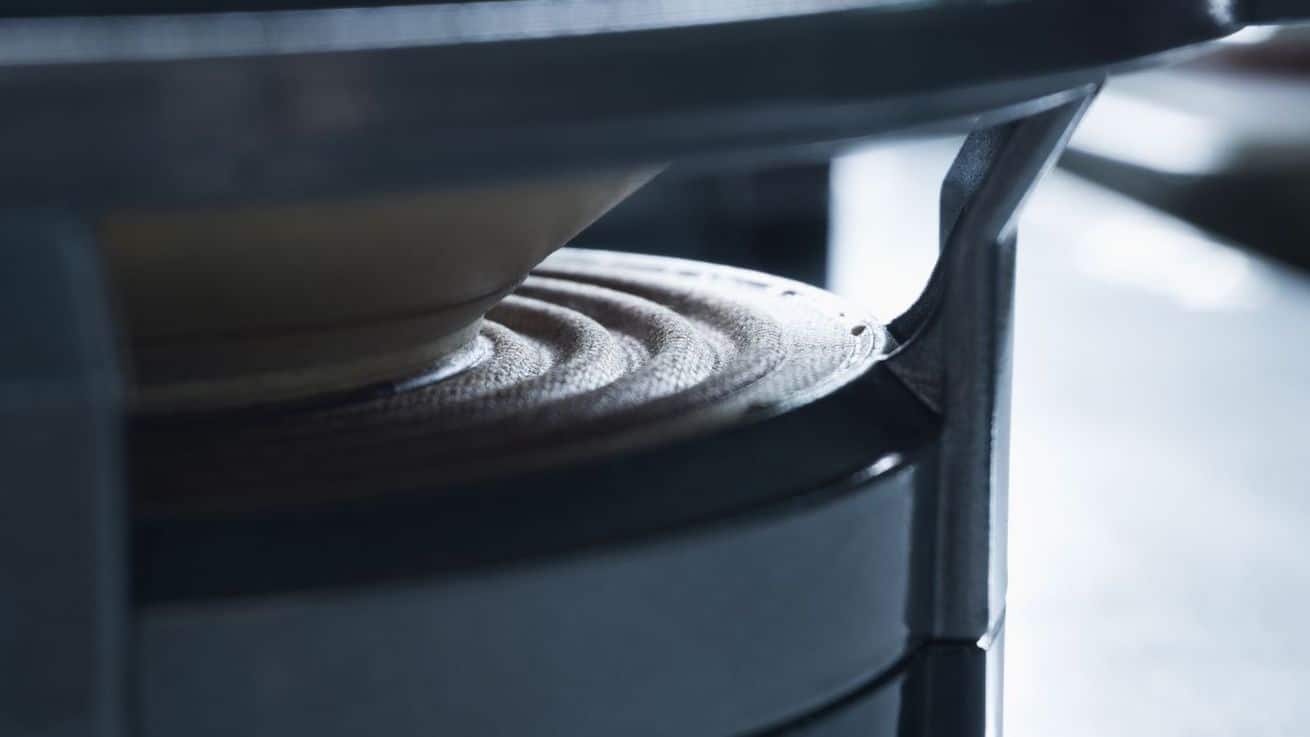
Now that we’ve identified the primary causes of engine sound in stereo, it’s time to explore the solutions. Here are some effective ways to eliminate any hissing sound:
- Enhancing ground connections
- Using noise filters
- Implementing ground loop isolators
- Addressing poor mounting
- Substituting defective amplifiers
- Introducing inline power filters
By implementing these solutions, you can enjoy a pleasant audio experience in your car.
In some cases, installing a capacitor may also help reduce any hiss sound. The advantage of using a capacitor is that it presents no impedance and will not diminish the voltage supplied to the battery. If these noises persist after installing a capacitor, try using an alternate capacitor.
Improving Ground Connections
As earlier stated, enhancing ground connections plays a critical role in reducing this whining sound. Start by checking all connections and examining the ground wire location to ensure proper grounding.
If the noise persists, try relocating the ground connection, which may resolve the issue by breaking the ground connection and extending the wire to an alternate grounding location.
After identifying an appropriate ground location for the stereo, connect the stereo’s ground wire to the identified ground location. Additionally, use a multimeter to measure resistance and ensure all ground connections are properly established.
Using Noise Filters
Noise filters, such as an inline noise suppressor, ground loop isolators, audio power filters, and noise reducers/suppressors, can be a lifesaver when it comes to eliminating hissing noises. They interrupt and absorb engine noise before it reaches the speakers, ensuring a clear and uninterrupted sound.
Installing a noise filter on the power line between the battery and the alternator can help deal with alternator noise in your car stereo system. The use of noise filters can help eradicate power source interference, leading to a more enjoyable audio experience.
Installing Ground Loop Isolators
Ground loop isolators are another effective solution for reducing noises caused by grounding issues. These devices minimize poor grounding problems caused by multiple amplifiers by grounding each amplifier with its own individual wire.
That said, during the installation of an isolator, avoid common mistakes like using an isolator with inadequate frequency response or employing cables of inadequate gauge. Ensuring proper installation will help you achieve the best results in reducing engine noises.
Dealing Poor Mounting
Poor mounting of car audio components can contribute to engine sound in car stereo. Inadequate mounting can lead to a bad ground connection, which can introduce noise into the audio system. To address this issue, ensure proper mounting techniques are employed, such as using rubber grommets or feet to isolate the amplifier.
Replacing Defective Amplifier
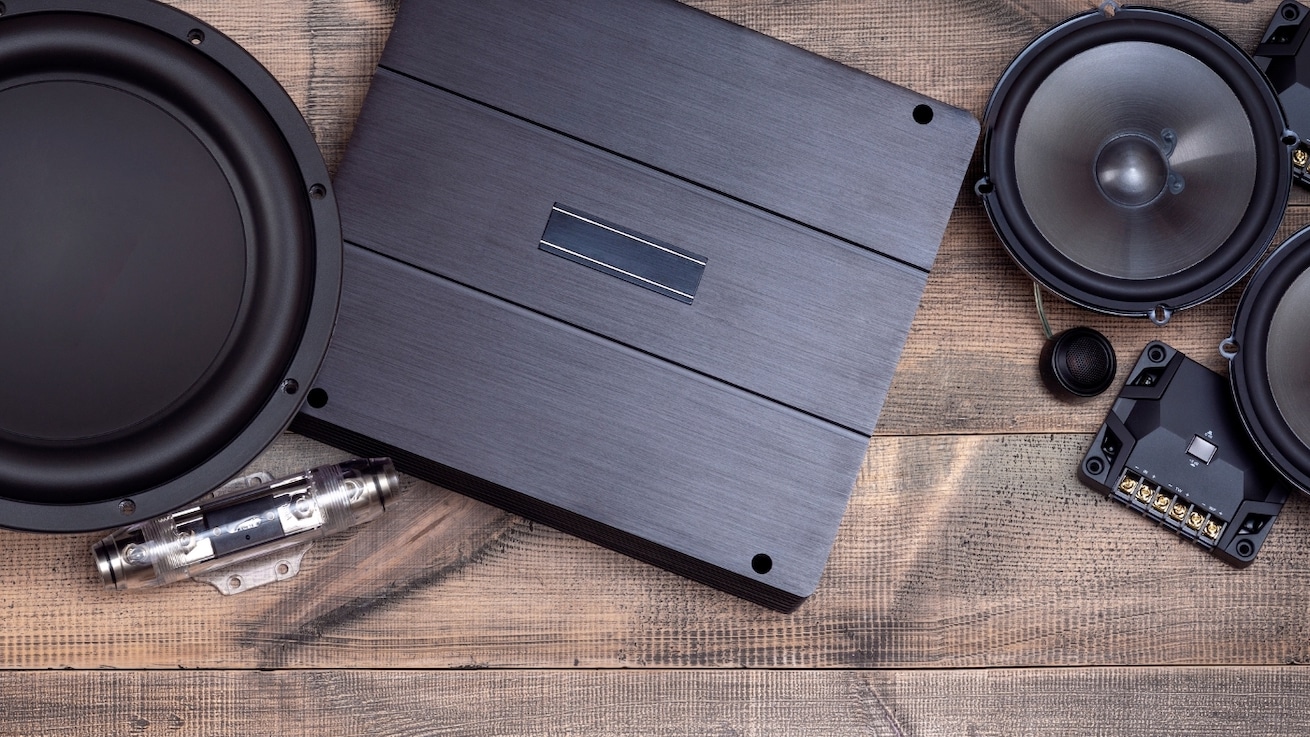 A defective amp can also be responsible for engine noises. Issues like ground potential differential caused by improper ground or mounting, faulty speaker wires, or incorrect wiring may be contributing factors.
A defective amp can also be responsible for engine noises. Issues like ground potential differential caused by improper ground or mounting, faulty speaker wires, or incorrect wiring may be contributing factors.
While dealing with defective amplifiers, choose an appropriate replacement that aligns with your car’s electrical system. Consult a professional technician if you’re unsure about the best course of action.
Install an inline power filter
Installing an inline power filter is another effective method to reduce high-pitch engine noise. These filters work by filtering out undesirable frequencies, ensuring a cleaner audio signal.
Inline power filters are particularly effective when the power wires are providing “dirty power” or a variety of power irregularities that your head unit may be encountering. Addressing these issues paves the way for a more enjoyable and noise-free car audio experience.
Dealing with Speaker Wiring and Engine Noise
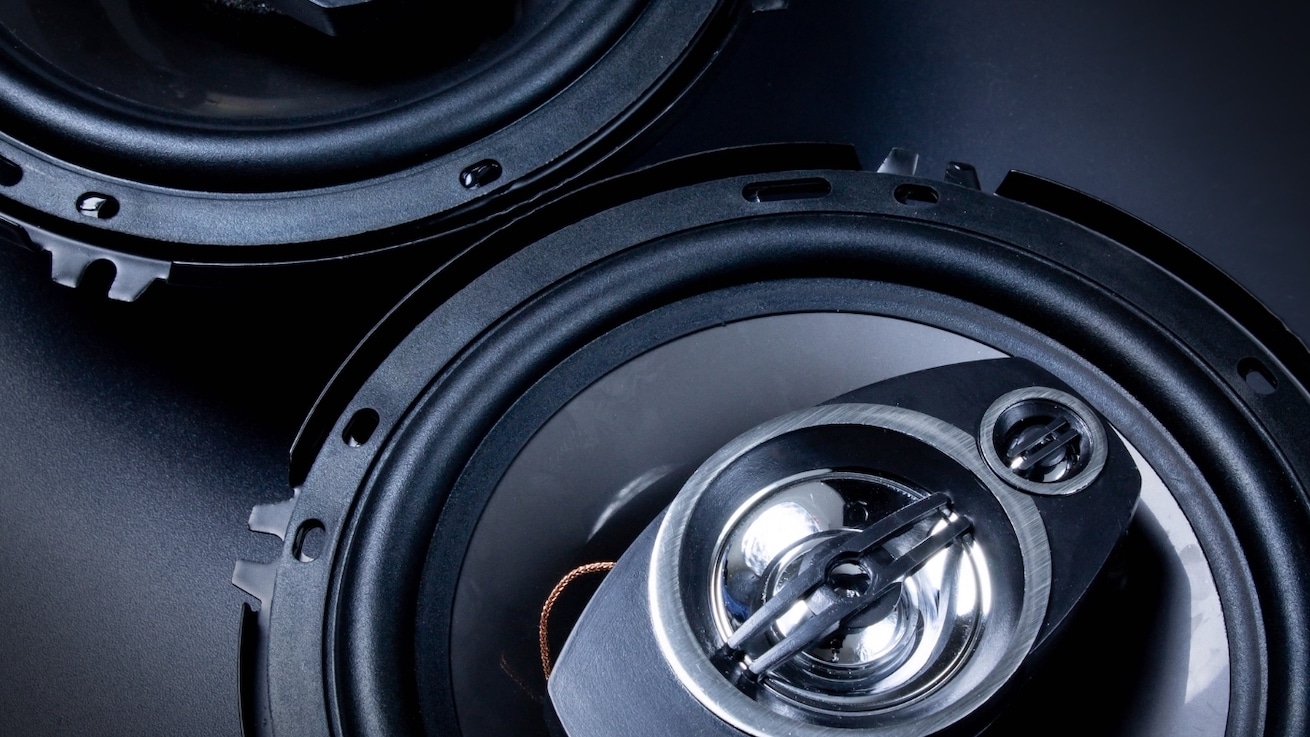
Speaker wiring can play a significant role in engine sounds. Combat this issue by repositioning wires or shielding them with magnetic shielding foil like Mu-metal to reduce any distortion. Mu-metal foil is a magnetic shielding material composed of an alloy of nickel and iron, which helps shield speaker wires from external interference.
In addition to repositioning and shielding wires, check for loose connections in speaker wiring. Inspect the wires and connections for signs of damage or wear, and use a multimeter to test the speaker connections.
Diagnosing and Fixing High-Pitch Whining Noise
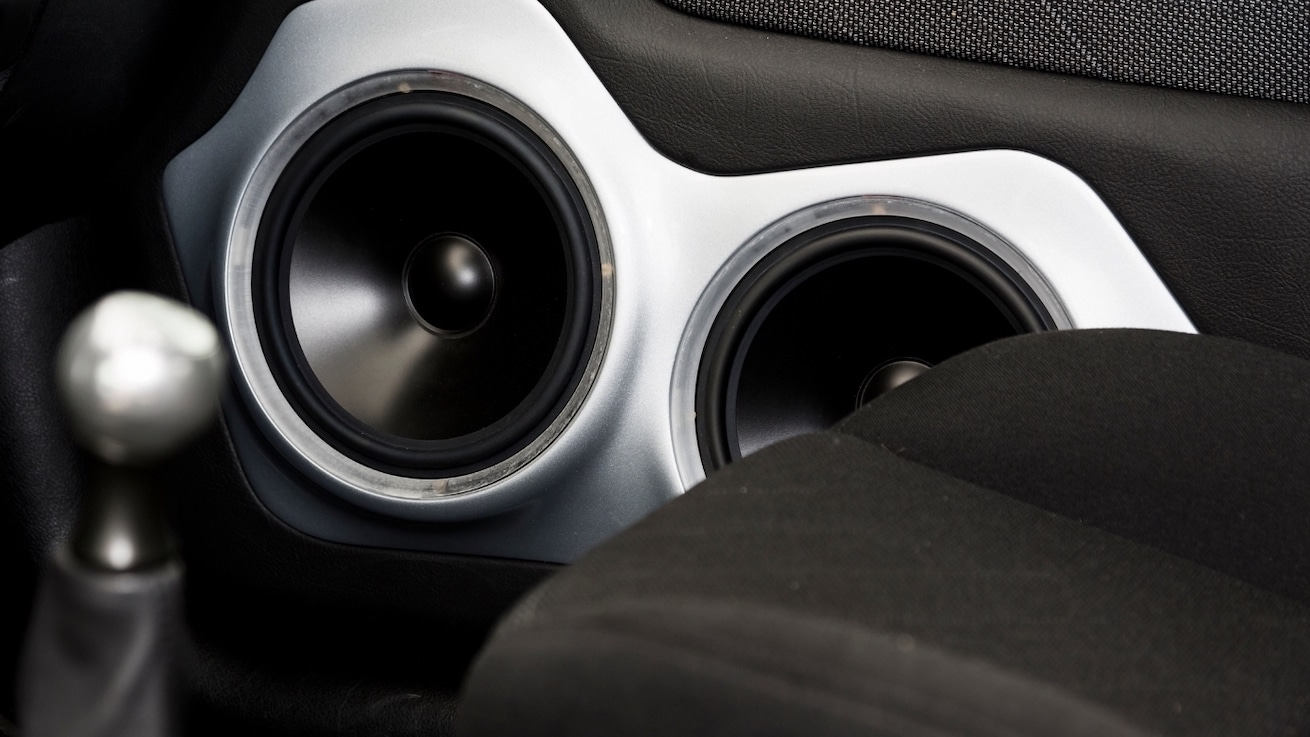
Begin resolving this issue by reconnecting the head unit’s power harness, testing the RCA cables, and checking the ground connections. If the noise persists after these steps, consult a professional technician for further assistance.
Another solution for high-pitched engine noise is the installation of an inline power filter, which can filter out undesirable frequencies that may cause distortion. Addressing these issues and implementing the right solutions will lead to a more pleasant and noise-free car audio experience.
Preventative Measures for Engine Noise in Car Speakers
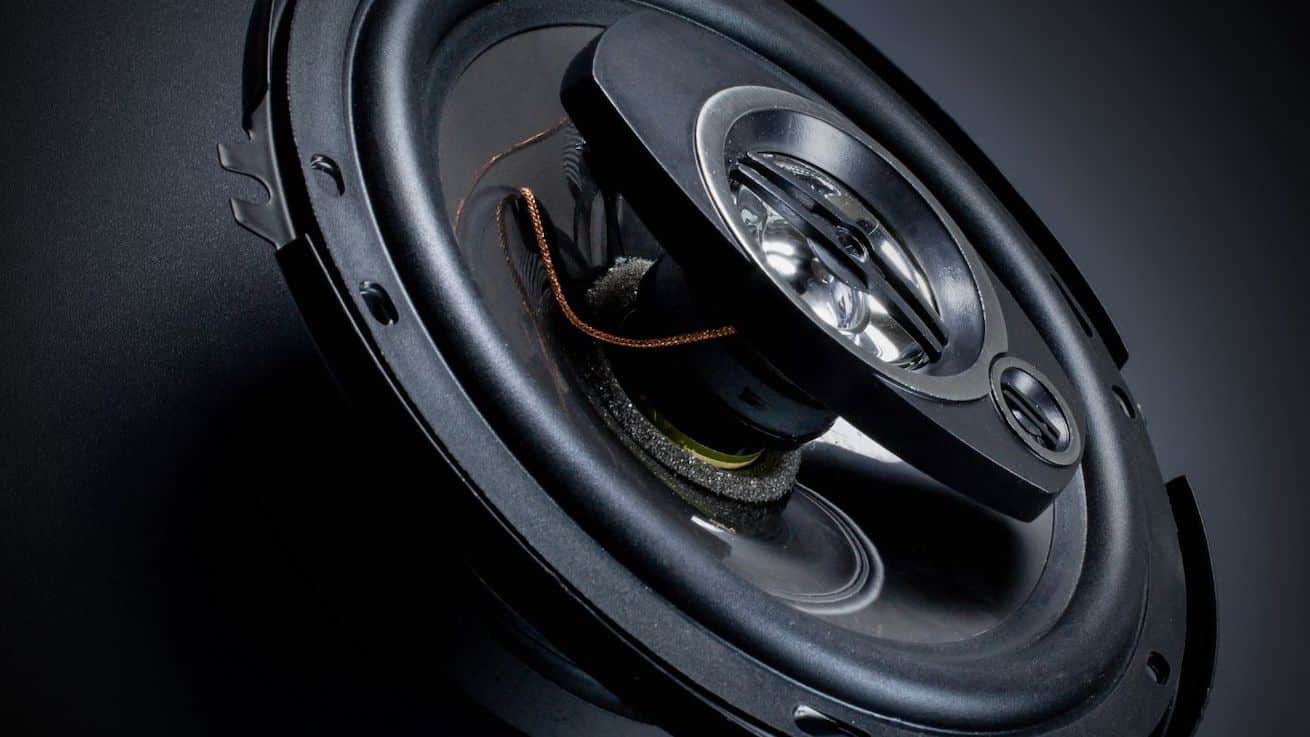 There are a few key preventative measures you can undertake to avoid this issue. Proper grounding, high-quality cables, and regular maintenance of the car’s electrical system are all essential in avoiding engine sound issues.
There are a few key preventative measures you can undertake to avoid this issue. Proper grounding, high-quality cables, and regular maintenance of the car’s electrical system are all essential in avoiding engine sound issues.
Another preventative measure is the “Big Three” upgrade, which involves augmenting the vehicle’s battery charging wire, power wire, and chassis ground wires with large gauge wires.
Taking these precautions guarantees a more enjoyable car audio experience with your sound system without the disturbance of noise coming from external sources.
Frequently Asked Questions: Make Sure You Read Them
How do I get rid of engine noise in my vehicle’s speaker?
To get rid of the engine noise coming through your vehicle radio, try using a ground loop isolator or inline noise suppressor, or alternatively, grounding one of the under-hood components. This should be able to resolve the issue.
Why is my car speaker making a weird noise?
It is likely that your car speaker is making a weird noise due to a malfunctioning head unit or an electrical disturbance caused by other devices transmitting electric signals. To test this, try disconnecting your current head unit and connecting an alternate one in its place.
Is it normal to hear your car engine?
It is normal to hear a certain level of noise coming from your car engine. However, if it is louder than usual, it could be an indication that there may be an issue with cylinder compression. If this is the case, you should have your car inspected to ensure everything is running properly.
Last Updated on: March 16, 2025


Especially helpful advice is to utilize a ground loop isolator and look for weak connections. Furthermore, the advice on using a noise filter and checking the head unit for problems is revolutionary. This book addresses all required skills to properly troubleshoot.